Custodial vs Non-Custodial Wallets: Keep Your Crypto Safe and Sound
When it comes to your cryptocurrency, one of the first decisions you’ll make is between a custodial vs non-custodial wallet. This choice can impact how secure your funds are and how much control you have over them. Choosing the right blockchain wallet based on your needs and preferences can also enhance your security and control over your digital assets.
In this post, we’ll break down what these wallets are, how they work and which one is better for your privacy-first lifestyle. Let’s make crypto storage less confusing and way more secure.

What is a custodial wallet?
A custodial wallet is a crypto wallet that is managed by a third-party provider that holds your private keys. This implies that the third party takes responsibility for security control over your crypto assets, transactions, and safeguards your funds. In other words, these providers keep your crypto for you the same way as a bank keeps your fiat money.
Custodial wallets are easy to work with because they have such features as customer support, password recovery, their own private keys, and also integrate with trading platforms. It’s like you keep your valuables in a bank vault. But you must trust a custodial wallet provider that has strong security measures.
What is a non-custodial wallet?
Having a non-custodial crypto wallet means you are in control of your private keys. It is critical to store your private keys and relatable funds in non-custodial wallets for securing your assets. Self-custodial wallets can take the form of a mobile app, a browser extension, or even a special hardware device. As there are no other people who have your keys, only you have access or can transfer your funds. Best non-custodial wallets also enable secured signing of transactions, protecting you against various crypto hacks and scams.
Storing your crypto in a non-custodial wallet resembles keeping your fiat cash in a safe. As a wallet owner, you have full control, but you are fully responsible for your blockchain wallet. If that’s fine with you, non-custodial wallet services are for you since you’ll manage your own storage fully.
Custodial vs non-custodial crypto wallet differences
There are major differences between custodial and non-custodial wallets:
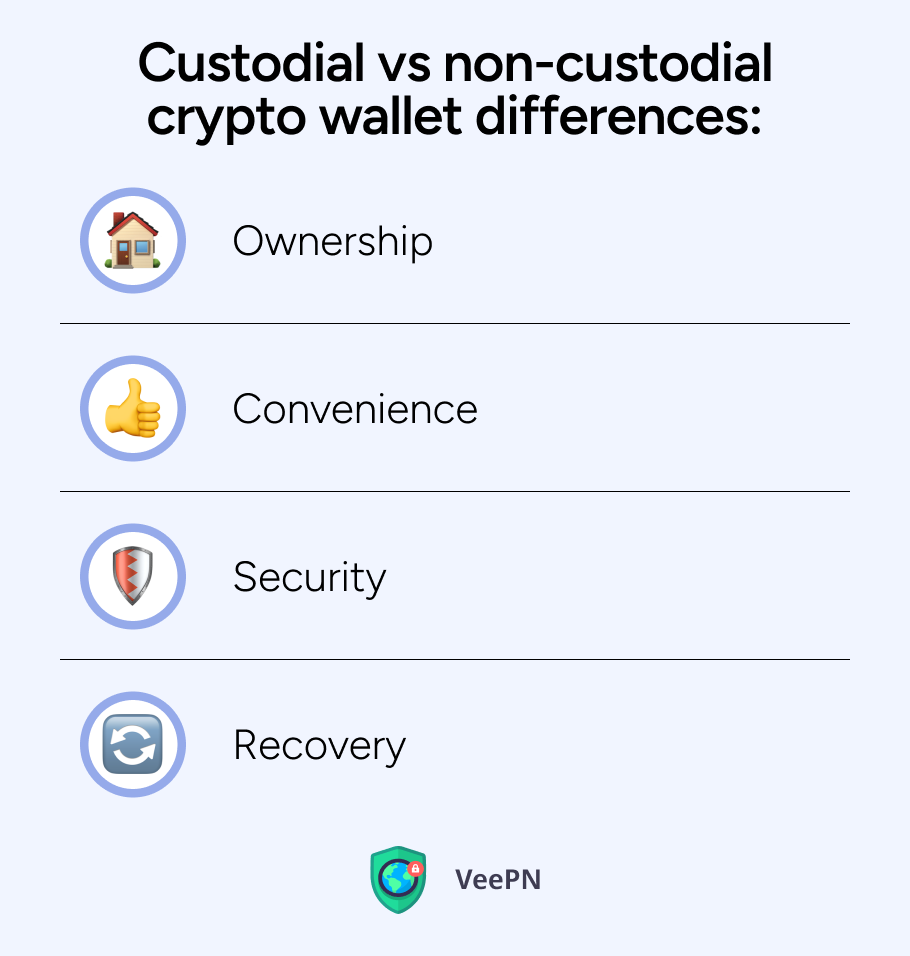
☯️Ownership: Custodial wallet means that a third-party service stores your keys, while a non-custodial wallet means you store your private keys. As you’ve guessed, the difference lies in who manages the keys.
☯️Convenience: Custodial wallet is not that complicated to use and requires minimal setup.
☯️Security: Non-custodial wallet provides better privacy and control. Nevertheless, the use of custodial wallets carries risks related to the dependence on third parties that may be a target for cyberattacks.
☯️Recovery: Custodial wallet has an option to recover the account; a non-custodial wallet means the loss of your private key forever, with you being unable to retrieve access.
But what about custodial wallets?
Pros and cons of custodial wallets
Let’s see custodial wallets pros and cons:
Pros:
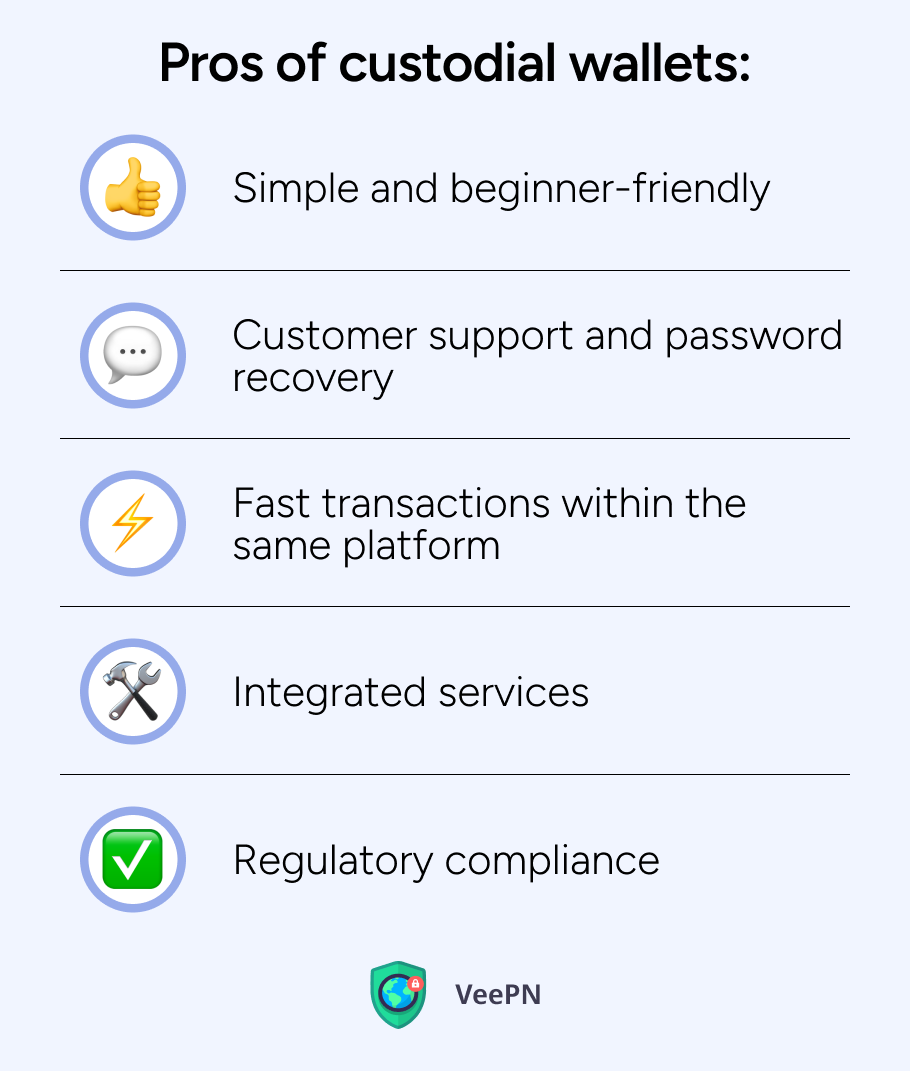
➕Simple and beginner-friendly: Designed for ease of use, custodial wallets are perfect for those new to crypto.
➕Customer support and password recovery: If something goes wrong, you can contact support and recover access to your wallet.
➕Fast transactions within the same platform: Transfers between users of the same custodial service are usually instant and free.
➕Integrated services: Many custodial wallets include features like crypto trading, staking, and fiat-to-crypto conversions.
➕Regulatory compliance: Custodial wallets often meet government standards, adding a level of legitimacy and consumer protection.
Cons:
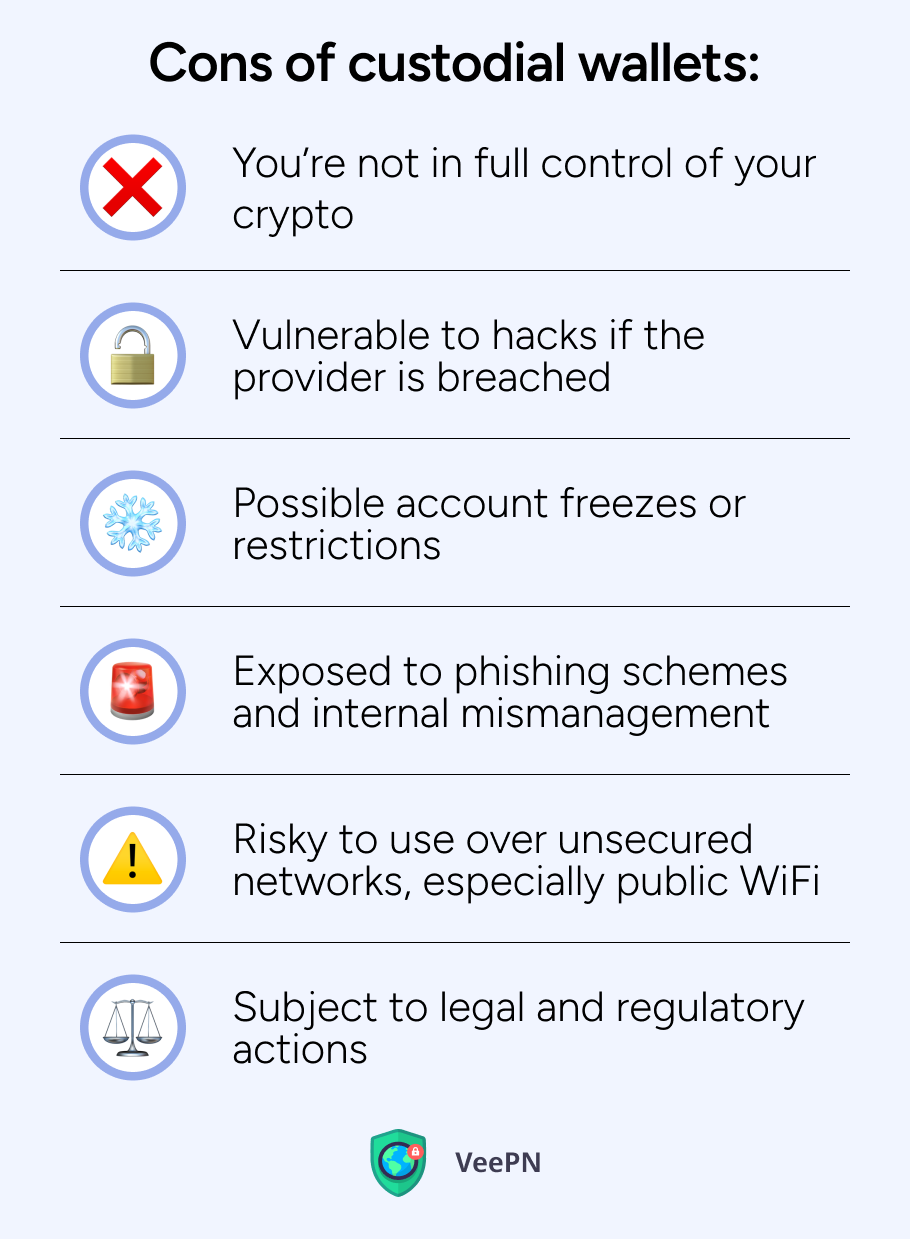
➖You’re not in full control of your crypto: The service provider has ultimate authority over your funds.
➖Vulnerable to hacks if the provider is breached: Centralized servers are prime targets for cyberattacks.
➖Possible account freezes or restrictions: Your access can be limited due to policy violations or platform errors.
➖Exposed to phishing schemes and internal mismanagement: Fraudulent links or insider threats can put your digital assets at risk.
➖Risky to use over unsecured networks, especially public WiFi: Without added security measures like a VPN, your data could be intercepted.
➖Subject to legal and regulatory actions: If a custodial service is shut down for some reason, your funds could be affected.
So overall, if you opt for custodial wallets, you must choose a trusted service provider to keep your funds safe. Let’s now have a look at non-custodial wallets.
Pros and cons of non-custodial wallets
Non-custodial wallets have their own set of pros and cons as well:
Pros:
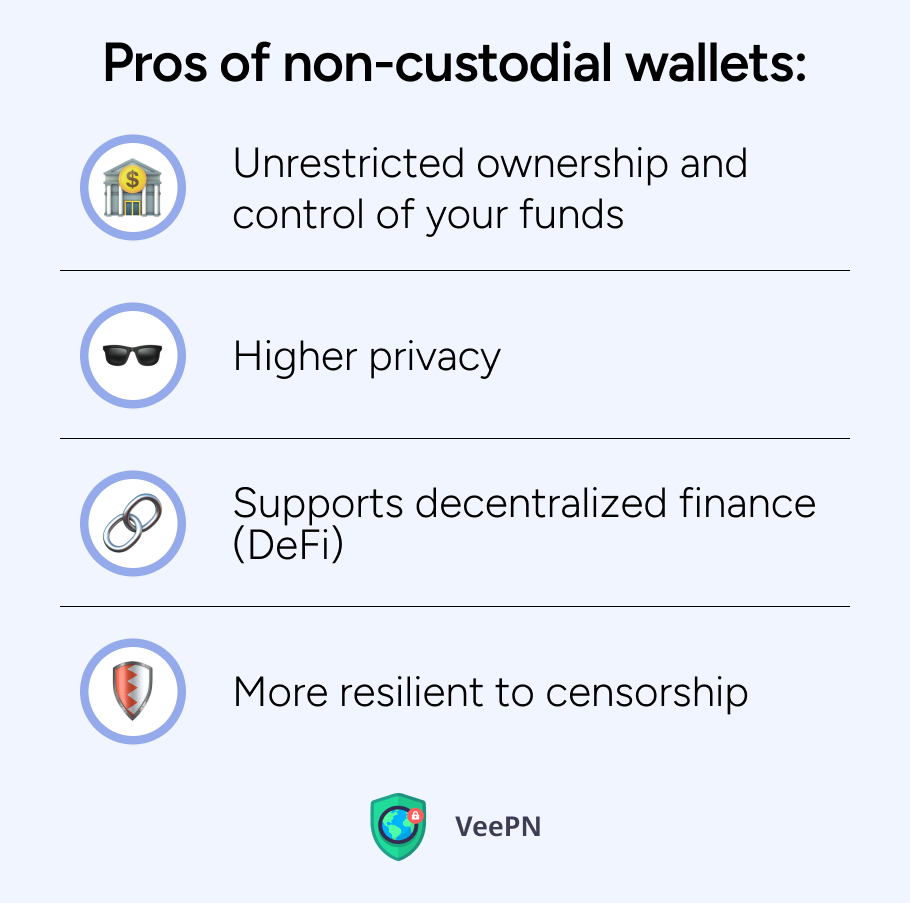
➕Unrestricted ownership and control of your funds: You directly control your crypto assets, without anyone interfering.
➕Higher privacy: These wallets are not demanding of your personal information, so protection of your identity is guaranteed.
➕Supports decentralized finance (DeFi): Non-custodial wallets are frequently necessary to gain access to DeFi tools and protocols.
➕More resilient to censorship: You manage your money independently, meaning you can not be blocked by governmental agencies or any other third parties.
Cons:
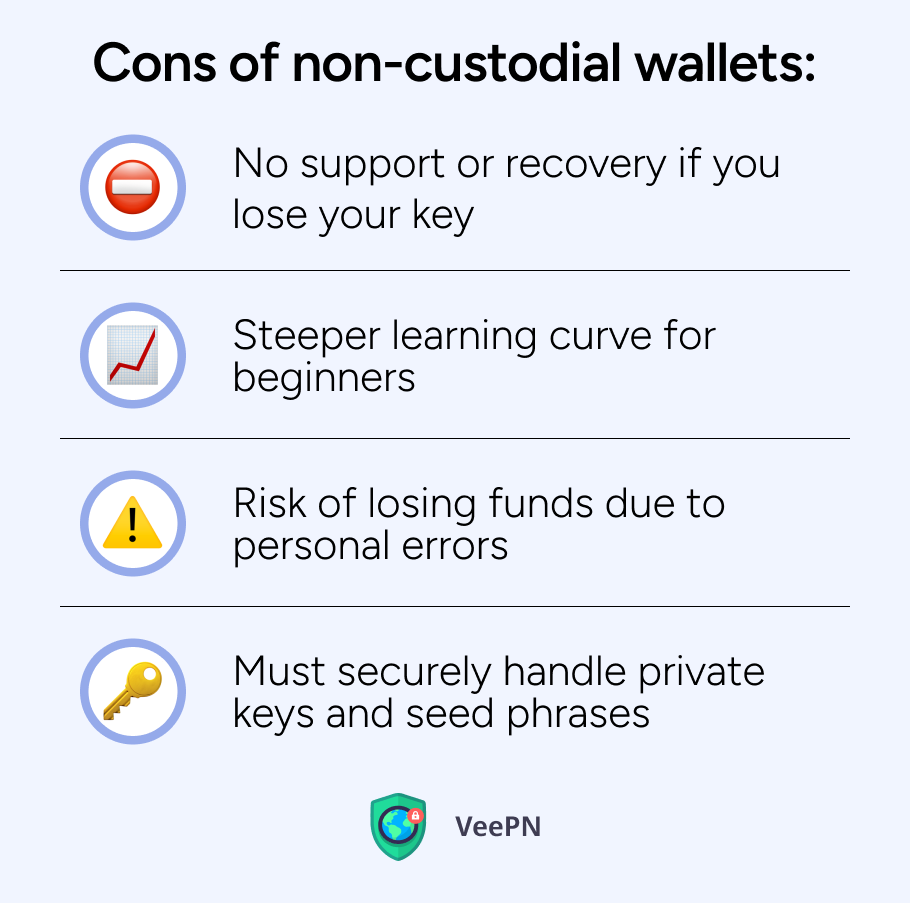
➖No support or recovery if you lose your key: There’s no help desk; lose your key, and your funds are gone forever. Non-custodial wallets require more responsibility as users must manage their own keys and navigate blockchain transactions.
➖Steeper learning curve for beginners: The setup and maintenance of a non-custodial wallet can be intimidating. It is crucial to have a proper backup for private keys and recovery phrases to avoid losing access to your funds.
➖Risk of losing funds due to personal errors: Mistyped addresses or lost recovery phrases can result in permanent wallet loss.
➖Must securely handle private keys and seed phrases: You’re responsible for storing this sensitive information securely.
Final tips on choosing your ideal wallet setup
If you’re new to crypto, a custodial wallet might be a good starting point. It gives you quick access and support while you learn the basics of managing cryptocurrency:
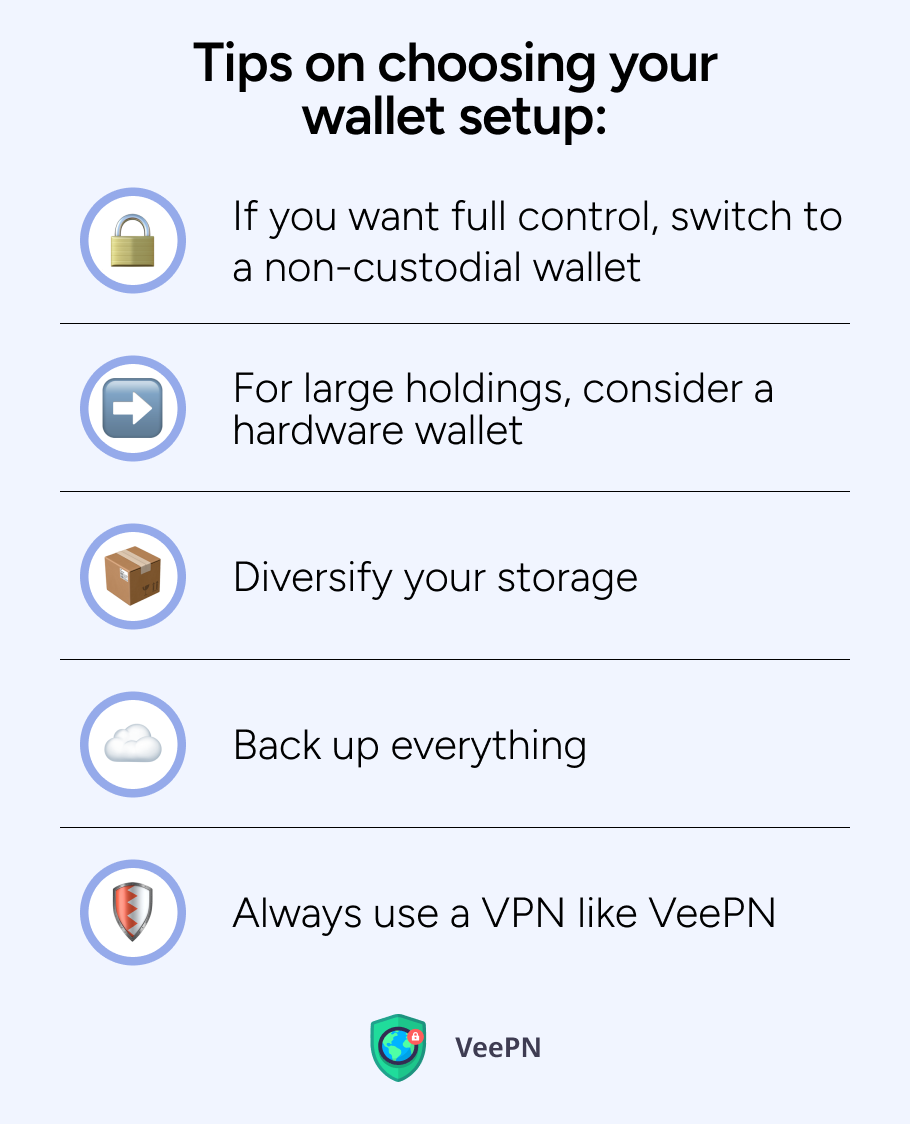
✅If you want full control, switch to a non-custodial wallet. It’s for experienced users who value privacy and know how to store seed phrases and private keys securely.
✅For large holdings, consider a hardware wallet. These offline, physical devices offer the highest level of protection against hacking and malware.
✅Diversify your storage. You don’t have to choose just one wallet for all your crypto. Many users keep a part of their crypto in custodial wallets for quick access and the rest in non-custodial or hardware wallets for long-term storage.
✅Back up everything. No matter which type of wallet you use, back up your recovery phrase and private keys. Store them offline in multiple safe locations. Custodial wallets often provide backup facilities, making it easier to recover funds if you lose access.
✅Always use a VPN like VeePN when managing wallets on public or unsecured WiFi. It encrypts your online activity so hackers, Internet Service Providers (ISPs) and anyone on public WiFi can’t read it. Whether you’re logging into a custodial wallet or transacting from a non-custodial one, a VPN secures your connection.
But why VeePN? Let’s find out!
Why VeePN is your crypto sidekick
VeePN has features for crypto users:
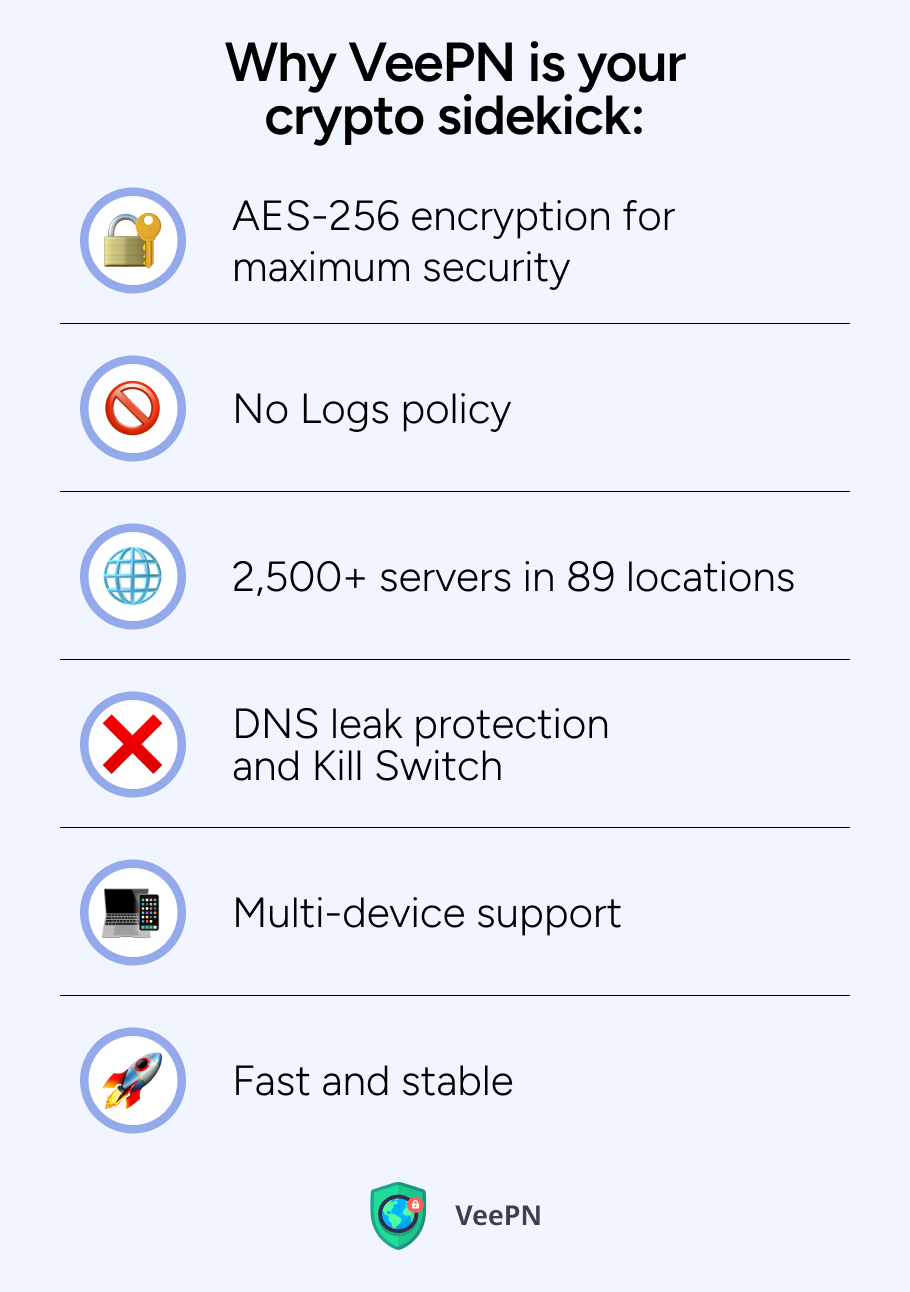
🛡️AES-256 encryption for maximum security: The best encryption protocol out there. You can be sure your Internet traffic won’t get intercepted by hackers or trackers.
🛡️No Logs policy: We don’t track or store your browsing activity, which is especially important for privacy when dealing with sensitive crypto transactions.
🛡️2,500+ servers in 89 locations: Access crypto platforms even in restricted or censored regions for smooth and uninterrupted trading.
🛡️DNS leak protection and Kill Switch: Your real IP address is never exposed, even if the VPN connection drops temporarily.
🛡️Multi-device support: Use one VeePN account to protect up to 10 devices at once — perfect for managing your crypto on your phone, tablet and desktop at the same time.
🛡️Fast and stable: Unlike many VPNs that slow down your connection, VeePN is optimized for speed so you can trade crypto without delay.
Download VeePN now and get a 30-day money back guarantee!
FAQ
It depends on your preferred level of control into account as you select a crypto wallet. Remember that custodial wallets make storage of your crypto easier by securing your assets for you with your private keys, while non-custodial wallets require you to take more effort but give full control over your savings security. Look for solutions with a strong encryption and secure backup, and choose a wallet that supports the cryptocurrencies you want to use. Use wallets only from official, authorized sources to reduce the risk of downloading counterfeits or malware. Additionally, consider using VeePN for adding an extra layer of security while running crypto transactions.
Your private keys are handled and controlled by Binance, which means it’s a custodial wallet. This streamlines the process for the users, though your funds would still be under Binance’s security and the policy controls.
MetaMask is a non-custodial wallet. You are the one in charge of your private keys and recovery phrase, MetaMask has no control over your funds.
VeePN is freedom
Download VeePN Client for All Platforms
Enjoy a smooth VPN experience anywhere, anytime. No matter the device you have — phone or laptop, tablet or router — VeePN’s next-gen data protection and ultra-fast speeds will cover all of them.
Download for PC Download for Mac IOS and Android App
IOS and Android App
Want secure browsing while reading this?
See the difference for yourself - Try VeePN PRO for 3-days for $1, no risk, no pressure.
Start My $1 TrialThen VeePN PRO 1-year plan







